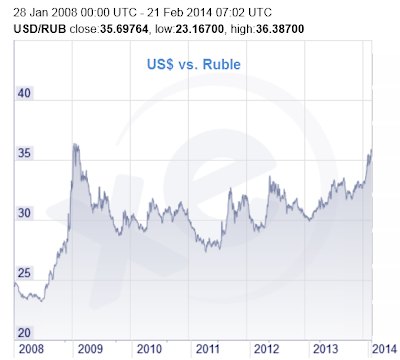The situation in Ukraine grows more desperate by the hour. President Viktor Yanukovic had already replaced the head of the army. Today Yanukovic replaced the head of all armed forces.
Given that lower ranks are divided in support, calling out the military could start an all out civil war.
“If there is a decision to use force to clear the protesters, it can be done but will start a civil war,” said Ihor Smeshko, former head of Ukraine’s SBU security services. “The army is so far neutral, but if it is pulled into this conflict it will be a point of no return. Army personnel are themselves split 50/50 in their views of Ukraine.”
The government prepared the way for using the army on Wednesday, when the defence ministry said the military could be deployed in “antiterrorist” operations. Authorities and legal experts had previously said the army could only be used within Ukraine if a state of emergency was imposed.
Mr Yanukovich on Wednesday night also replaced the head of all Ukraine’s armed forces with the former navy chief – just weeks after he already replaced the head of the army – in what appeared to be a move to ensure loyalty in the top ranks.
“[The Yanukovich government] have put their placemen into the army,” said James Sherr, a Ukraine scholar at London’s Chatham House think-tank. “But still the question is what proportion of units would obey such orders?”
Financial Crisis Threatens Russia
The Telegraph reports Financial crisis threatens Russia as Ukraine spins out of control
The dramatic escalation of Ukraine’s civil conflict and fears of Russian military intervention have sent financial tremors across Eastern Europe, turning the region into the new fulcrum of the emerging market crisis.
“This has suddenly gone from a domestic Ukrainian story into a geopolitical clash,” said Lars Christensen, from Danske Bank.
The Russian ruble has fallen to a record low against the euro, with contagion reaching Poland, Hungary and Romania in recent days. “The moves in Russia are very like the events during the war in Georgia in 2008. Markets are pricing in the risk of Russian intervention,” he said.
Regis Chatellier, from Societe Generale, said there is a “high risk” that Ukraine will be pushed into default on its €60bn sovereign debt, triggering a credit shock for Russian banks. Sberbank and VTB are both large holders of Ukrainian bonds. Global emerging market bond funds hold 3pc of their portfolio in Ukrainian debt. “The spillover effect of a Ukrainian default would be significant, but not systemic,” he said.
The decision by the Ukrainian nationalist stronghold of Lvov this week to declare “independence” from Kiev has upped the ante, creating a volatile climate in which the Ukrainian army may be forced to intervene to head off civil war.
“Ukraine is on the verge of splitting into two countries. We’re looking at events that we have not seen in Europe since the break-up of Yugoslavia,” said one City economist with links to Lvov. “When you have this level of hatred and mistrust, anything can happen.”
Ukraine’s foreign reserves are down to survival levels. Russia has so far kept the country afloat with a $3bn loan, the first tranche of a $15bn bailout, but further payments are in doubt.
Russia faces the choice of large losses from a default or the ever rising costs of propping up Ukraine’s economy. Military intervention to subjugate the rebels in the Catholic strongholds of Western Ukraine orbit could lead to a quagmire.
The International Monetary Fund said in a report for the G20 summit this weekend that emerging market woes are the key risk for global recovery, warning that a trifecta of “capital outflows, higher interest rates and sharp currency depreciation” could set off a corporate debt crisis.
Societe Generale said in a new report that emerging markets have risen from 18pc of world output to 40pc over the past 20 years, implying that a broad upheaval in these countries today would have “much greater ramifications for the global economy”.
US$ vs. Ruble
Euro vs. Ruble
It is impossible to know what’s ahead. A civil war could break out tomorrow, but so could another cease fire. The military could even oust the president.
The longer this simmers, the more pressure there is on emerging markets and the more pressure there is on any banks that lent money to Ukraine. Meanwhile, check out the collapse in the Ukranian Hryvna.
Euro vs. Hryvna
So far, things are still orderly. If a full scale civil war breaks out, it won’t be.
Mike “Mish” Shedlock
http://globaleconomicanalysis.blogspot.com


